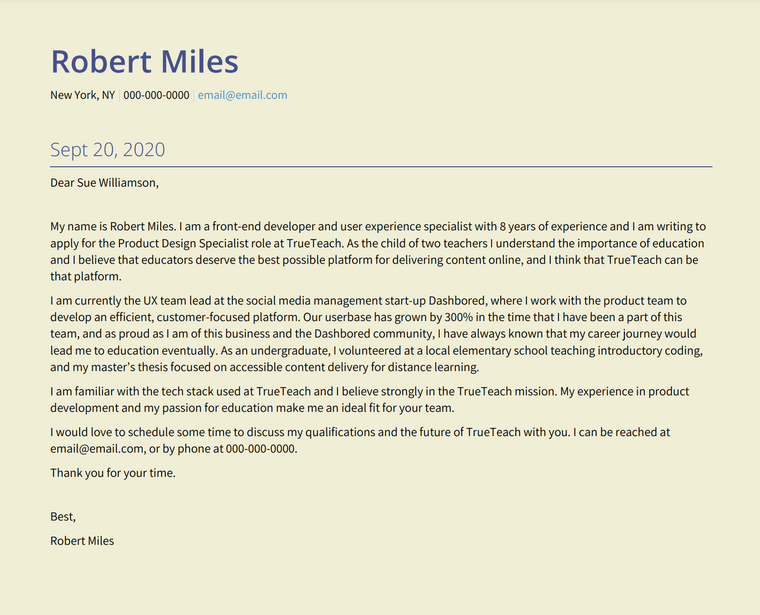
Your Top 10 Job Search Questions Answered

So you’ve written a great resume and it’s time to set out on the job search. Finding a job is tough, and like most job seekers you probably have some questions about how to get the most out of your job search.
To help you get started, we have collected the top 10 most commonly asked job search questions and answered them below.
With this job search FAQ you will have the answers you need to begin the hunt for your dream job.
Recommended links:
- Our collection of 500+ professional resume examples.
- Our gallery of 20+ downloadable resume templates.
Which job search website should I use?
There are so many job search sites available online that it can be hard to know where to begin. The most popular online job board is Indeed, which is a good place to start. Many job seekers also use Monster and even Craigslist. The professional networking site LinkedIn offers a job board component, as well as networking opportunities that may well beget an interview. You can even use Facebook to look for work. For a larger list of job search sites, check out VisualCV’s Job Search Sites - The Ultimate List.
To narrow your search, it is a good idea to use industry-specific job boards in your field. If you are a designer, for example, try Behance or Dribbble. If you are a freelancer, try Upwork or Taskrabbit. If you are still in college, maybe Internships.com is the right fit. Have a look at Dice or Stackoverflow if you are in the tech industry. Decide what kind of opportunity you are looking for and focus on the job boards that will help you achieve that goal. Any job search website that gets you closer to your dream job is the one you should be using.
Should I apply for a job even if I don’t have the required experience?
The requirements listed in job postings are rarely truly required. Job postings are more like wishlists, or descriptions of a perfect but impossible candidate. Employers have an ideal employee in mind, but they are realistic about the likelihood of that candidate actually existing. They know that the successful candidate may not meet every single item listed in the posting.
Of course, this does not mean that you should apply for every single job you come across. If a position is wildly beyond your experience level, you are better off saving your energy for something more attainable. An employer looking to fill a high-level management position is not interested in an applicant fresh out of college. If, however, you have some but not all of the requirements, and the role truly seems like something you can thrive in or grow in to, go ahead and apply.
Your skills and experience may not meet the precise criteria laid out by the job posting, but they could have prepared you for the role in some other way, or at least prepared you to learn quickly. Though a job posting may ask for someone with six years of experience, as long as you know you can succeed in that position you should still feel comfortable applying with only three or four. Many professional skills are transferable and sometimes an eager and dedicated employee is better than an experienced one. Customize your resume to show that despite not meeting the requirements exactly, your experience and enthusiasm have prepared you to excel in the role. Even if you meet only 75% of the requirements, every other candidate might meet only 74%!
Should I follow up after an interview?
Following up after a job interview is an important way to improve your prospects of getting hired. When choosing a candidate a hiring manager will consider your skills and experience, the quality of your resume, and the strength of your interview, but the the decisive factor can be as simple as which candidate they best remember when they make their decision. You can ensure that your name stays at the top of the employer’s mind by sending a quick thank-you note to follow up.
Your thank-you email promptly, ideally within the first 24 hours. The message should be short and polite, should be clear about who you are and what role you interviewed for, and should make reference to a topic or detail that was discussed in your interview. A thank-you message is a quick and simple way to remind the hiring manager about your interview and show that you are enthusiastic about the job.
If a few weeks have passed since your interview and you still haven’t heard back, a brief check-in email is also acceptable. You don’t want to be pushy, but you can indicate that you are still enthusiastic and would love to hear back. Connecting via LinkedIn or other social media is another option. Again, this simply reminds the hiring manager that you remain interested in the position and keeps you at the top of their mind.
For more tips about following up, you may want to read VisualCV’s How to properly follow up after the job interview.
Should I write a cover letter?
A cover letter is an important tool for selling yourself to potential employers. Typically sent alongside a resume, a cover letter is a short document containing a few paragraphs that introduce you to the employer and describe what distinct qualities you can bring to their company. The format of a cover letter allows you to present a distinct career narrative and really let your personality shine through in ways that a resume does not.
Further, a cover letter is an opportunity to account for any red flags your resume may raise. You might be able to get ahead of employer concerns by using your cover letter to explain any issues like job-hopping or long periods of unemployment.
For these reasons, you should always write a cover letter for each job application. There are some exceptions — for example, if the job posting specifies otherwise or, in the case of an online application, if the submission form does not contain a field for cover letters — but in general, a cover letter is too valuable a tool to leave out of your application.
With a CV builder like VisualCV, you can create a cover letter that matches your CV template.
When is the best time to look for a job?
Just as business is better in some months than others in most industries, the number of hiring opportunities will vary throughout the year. If you are intending to look for a new job, it may help to plan your search for the right time of year.
Many companies do the bulk of their hiring early in the year, beginning in January and February. Back at work after the holiday season and looking forward to a new year, managers are looking to establish their team and set priorities for the coming months. By applying in January and February you can make sure you’re a part of the flurry of hiring that marks the beginning of each year.
Hiring remains high throughout the spring. Though a slight drop from February, the months of March, April, and May are still good for applying for jobs. June, however, marks the beginning of a lull that lasts until August. Hiring reaches a low point in summer, when managers have their teams in place and executives would rather be on vacation than training new employees.
Hiring tends to ramp back up in the Fall, but it’s complicated; September and October bring a spike in new hires, but the holiday season represents the lowest hiring of the year. Early autumn is a great time to look for a job, but when November rolls around many companies are nearing the end of their budget and beginning to look forward to the holidays, preferring to wait until January to make any changes to their teams. An important exception to this rule is the retail industry, as the holiday season brings some of the most lucrative months for retail companies. If you are looking for seasonal work in the retail industry, November and December are excellent months to apply.
How do I stay motivated during the job hunt?
Searching for a new job is a stressful time, the pressure of which can lead to anxiety, depression, and burnout. To avoid negative outcomes like these, it is important to maintain a healthy lifestyle that facilitates continued motivation. VisualCV has explored this question in greater detail in the article How to Avoid Job Search Frustration and Anxiety, but here, in summary, are some important steps you can take to stay energized:
- Keep a schedule: Creating a set daily routine is an excellent way to ensure that you don’t spend your period of unemployment sleeping through the day and wasting time. By waking up each day with the intention to spend a certain number of hours working on your job search, you can be sure that you won’t lose track of time and let the days slip by.
- Set goals: Create specific and achievable goals each day to ensure that you have concrete accomplishments to work toward throughout your job search. This is important for maintaining a feeling of effectiveness. Looking back at each day, you want to be able to feel that you completed something, not that the day was wasted. Setting daily, weekly, and monthly goals is an effective strategy for cultivating ongoing motivation.
- Take breaks: Burnout is a serious risk in periods of stress. Spending every waking hour on your job search may seem like a great way to find a job quickly, but if your unemployment stretches on you may find yourself succumbing to anxiousness and losing motivation. Pacing yourself by taking breaks -- whether you take small breaks throughout the day, take weekends off, or even take a week or more off to settle your mind -- is a great way to stay motivated over the long term.
- Stay healthy: Don’t let your physical health decline with the loss of your regular work routine. When creating a schedule for yourself, include time for exercise, whether it’s heavy weightlifting or simply taking a walk. Meal planning can also help; you don’t want to stress-eat yourself out of shape. Keeping your body healthy is integral to keeping your mind healthy.
- Spend time with people: One effect of unemployment is that, without a workplace to go to, you have much less reason to leave your house. Hunched over your computer browsing job boards for too long is not great for your social skills! Make sure to spend time with your friends and family so that you don’t have only yourself for company. Joining a club or activity group is a great way to get out of the house, but even grabbing a quick coffee with a friend can help you get the social interaction you need.
- Don’t worry too much: It’s normal for a bout of unemployment to last six months or more. Stay enthusiastic about your career prospects and you can be confident that sooner or later you will have a job again.
Should I apply for jobs in person or online?
Applying for jobs in person is usually not necessary. Most companies use an online system to manage their hiring process, and trying to bypass this process won’t improve your prospects. In fact, many job seekers hoping to stand out by applying in person will show up to an establishment only to be asked to go home and apply online. Whenever a web-based application is available, apply online and save yourself the trip.
There are exceptions, of course. For front-facing jobs with high turnover, such as food services or retail, applying in person can be an asset. In positions like this you may be able to speak directly to a manager, and if turnover is especially high you could be hired on the spot. So, while many industries rely on the cold efficiency of online applications, if you are applying as a cashier, bartender, or something similar, applying in person can be an opportunity to make a good impression.
If you do decide to apply in person, be sure to prepare yourself. Research the company, and make sure that you understand the responsibilities of the position. When you apply in-person you will be asked about your resume and your work experience, and you may have to fill out an application, or do an on-the-spot interview.
How to do I search for a job effectively?
When entering the frenzy of today’s job market, it is important to have a strategy. Haphazardly sending your resume to any job posting that catches your eye may eventually land you a job, but it won’t land you the right job. Instead, a more proactive approach is recommended. Here are some quick tips for an effective job search:
- Have Clear Career Goals: Don’t idle your days away scrolling through generic job boards waiting for the right position to open up. Have a clear idea of what type of job you want and actively seek it out. Find industry-specific job boards, attend local industry groups and job fairs, and scour the websites of companies that you want to work for. Your dream job won’t come to you, you have to go to it.
- Target your applications: For every position you apply to, research the company and tailor your resume accordingly. Each application you send out should be customized to suit the role.
- Network - Join clubs and attend meetups. Seek out job fairs and industry events. You should expend as much energy making professional connections as you do applying for jobs, if not more.
- Prepare for job interviews: No matter how charismatic you think you are, a job interview is not a place to wing it. Research the company and role you are applying to and develop strong answers to all potential interview questions.
- Stay Motivated: It is important to stay healthy, focused, and dedicated throughout your job search. We discuss this in greater detail above.
- Use online job search tools: Use an online CV builder to create your resume, and use online job boards to look for open positions. When you aren't applying directly, establish profiles on LinkedIn and Twitter and participate in online communities relevant to your industry. With a social media presence you can make connections, learn about upcoming opportunities, and keep up with industry news. Staying involved in your professional community is important, even when you are unemployed. For more tips on using online job search tools check out VisualCV’s 7 Online Strategies to Help Your Job Search.
How do I look for a new job while am still employed?
When you decide to leave your current job and begin looking for new opportunities you may be tempted to quit immediately and begin looking for new work while unemployed. The freedom to dive into your job search unimpeded by work responsibilities is tempting, but quitting your job before you have a new position lined up is unwise. Unfair as it may seem, hiring managers tend to prefer candidates who are employed, and there is no way of knowing how quickly you will be able to find new work. It is always best to minimize the amount of time you spend unemployed.
Embarking on a job search while employed does come with certain difficulties, however. You don’t want your boss or coworkers to know that you have your eye on the door, and scheduling interviews and applications can become difficult when your work duties remain a priority.
If you are looking for a job while employed, here are some tips for doing it right:
- Be discreet: Don’t let any of your coworkers know that you are looking for a new job. People may resent you for leaving, start vying for your position, or tattle to the boss. Keep your search to yourself until you have accepted a job offer.
- Don’t look for your next job on company time: Using company time to look for your next job is a fireable offense. When you are at work, your focus has to be on the job you have, not the job you will have next. It is important to continue to complete your work duties to the best of your ability, even if you will soon be leaving this role.
- Don’t use any work equipment: Use your own phone and computer for any job search-related tasks. Never use your work email or company-issued phone to apply for jobs or correspond with potential employers. Company property is intended for work use only, and your use of this equipment may be monitored.
- Let your interviewing company know that you are currently employed: Always inform the hiring company that you are currently employed. This will help them schedule an interview time that works for you, and it will ensure that they don’t blow your cover by calling your current employer for a reference.
- Schedule interviews outside of work hours: Scheduling a job interview can be difficult when you are working full time. Many hiring managers will be understanding of your circumstances and schedule the interview for after work or during a lunch break, but this isn’t always possible. If you can’t arrange an meeting during your off-hours, you may need to take a personal day to accommodate an interview.
How do I do network effectively to help my career?
Networking is vital to a successful job search. At least half of the time you spend looking for a job should be spent networking. Networking can result in new contacts, telephone or in-person meetings, and even referrals.
This is a daunting task, but forming and maintaining a robust professional network is one of the best things you can do for your career. Most jobs are found through networking. To rely exclusively on cold applications is to put yourself at a distinct disadvantage.
To begin building a network, the first step is to assess the network you already have. Even if you are new to your career, you know plenty of people for lots of different reasons. Though you may find it awkward at first, it is acceptable to discuss career opportunities with friends and family. Connections can come from anywhere, and you never know who has an opportunity for you until you ask. Identify people who may be able to help you and reach out to them.
Your next step is to begin expanding your network. Attend industry events, including seminars, socials, and job fairs. Meet people in your industry and cultivate enthusiasm for learning about people, discussing their careers, and making connections. You can also browse online discussion on industry forums and message boards, as well as social networks like LinkedIn, both as a means of maintaining relationships and making new connections.
Once your network begins to grow you can start reaching out. When contacting members of your network, it is important to have clear goals. You should know what sort of a job you are looking for, and you can’t be afraid to ask about it. Asking for specific information, a specific favour, or an interview makes it easier for your contact to know what you are looking for and whether they can provide it. If you are too vague, your connection will not know what you want and your inquiries will go nowhere.
- Which job search website should I use?
- Should I apply for a job even if I don’t have the required experience?
- Should I follow up after an interview?
- Should I write a cover letter?
- When is the best time to look for a job?
- How do I stay motivated during the job hunt?
- Should I apply for jobs in person or online?
- How to do I search for a job effectively?
- How do I look for a new job while am still employed?
- How do I do network effectively to help my career?

Written By
Ben Temple
Community Success Manager & CV Writing Expert
Ben is a writer, customer success manager and CV writing expert with over 5 years of experience helping job-seekers create their best careers. He believes in the importance of a great resume summary and the power of coffee.

Having the right answers is an important part of a successful job interview, but having the right questions is important too. Make sure you know what you're going to ask your employer before your next interview.
June 18, 2020
Read Post

Community Success Manager & CV Writing Expert

Your resume should be short enough to hold employers' attention, but long enough to highlight all of your important skills. Finding the right balance can be tricky.
February 8, 2025
Read Post

Community Success Manager & CV Writing Expert

Over 50+ professional cover letter examples to include with your job application in 2025 - easy to create a custom cover letter for each application.
January 2, 2025
Read Post

VP Marketing & Resume Expert
Copyright ©2025 Workstory Inc.

